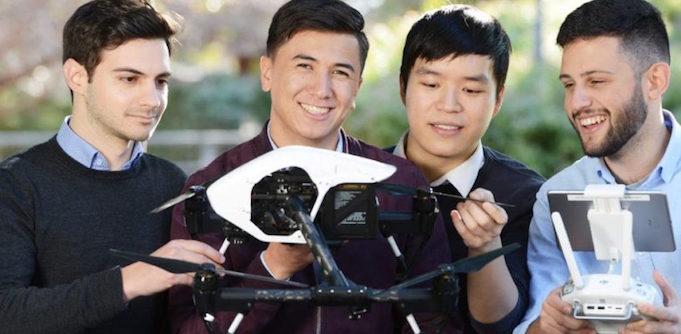
The Wright Technologies team.
A South Australian startup that is using blockchain to securely track and identify drones will head to France next week to meet with major defence and aerospace companies.
Adelaide-based Wright Technologies aims to conduct field trials of its drone identification and tracking system before the end of the year and has already been in talks with a defence company in Australia.
Last year the fledgling company won the International Grand Prize at the ActInSpace innovation contest, which is initiated by the French Space Agency (CNES) with support from the European Space Agency (ESA) and the Business Incubation Centres network. Awarded at the Toulouse Space Show 2018, the prize included a zero-gravity flight in the A310 ZERO-G.
Members of the Wright team will travel back to France next week to network in Toulouse’s Aerospace Valley and take the zero-gravity flight in Bordeaux.
“We’ve got some meetings scheduled with some big defence companies and we’re hoping to establish some networks in that Aerospace Valley in Toulouse so hopefully something comes out of it to help get the ball rolling,” Wright Technologies chief executive officer and co-founder Kosta Canatselis said.
“We’re working on being able to understand what device is where with absolute certainty with something called proof-of-location,” he said.
“In the context of air safety and security, airspaces at the moment are very closed off and restricted because of the danger of having drones there and not being able to understand where they are.”
Wright Technologies is based at the University of South Australia’s Innovation and Collaboration Centre.
The startup is also a finalist in next month’s $100,000 Blockchain Innovation Challenge, which will be held as part of the ADC Global Blockchain Summit in its home state of South Australia from March 18-20.
Canatselis said GPS on its own was not secure and could be “spoofed”.
He said his tamper-proof blockchain technology would be particularly valuable in applications dealing with the freight of high-value goods.
“With autonomy, as soon as you can start increasing the level of trust between different stakeholders you can start letting go of human interaction,” Canatselis said.
“Basically how blockchain works is there is an immutable ledger (a record that cannot be changed) where all the actions are recorded and you can start seeing things like a drone delivering something to a house, proving it has been to the house and then releasing payment and things like that.
“Proof-of-location is a problem that exists — there are a few other companies trying to do it as well — but our big differentiator is that we are able to operate on resource-constrained devices such as drones and small devices that other competitors out there aren’t able to do.”
This article was first published on The Lead. Read the original article.
NOW READ: Ten Australian blockchain companies raising millions and disrupting industries


COMMENTS
SmartCompany is committed to hosting lively discussions. Help us keep the conversation useful, interesting and welcoming. We aim to publish comments quickly in the interest of promoting robust conversation, but we’re a small team and we deploy filters to protect against legal risk. Occasionally your comment may be held up while it is being reviewed, but we’re working as fast as we can to keep the conversation rolling.
The SmartCompany comment section is members-only content. Please subscribe to leave a comment.
The SmartCompany comment section is members-only content. Please login to leave a comment.